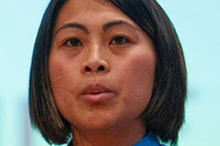Ensuring All Children Are Free From Experiences of Slavery
 Minh Dang is being honored as a Champion of Change for her efforts as an AAPI Women leader.
Minh Dang is being honored as a Champion of Change for her efforts as an AAPI Women leader.
One of the first neuroscience lessons I received was through reading Parenting from the Inside Out by Daniel Siegel, M.D. and Mary Hartzell, M.Ed. I learned that the relationship between a parent with their child directly impacts the child’s brain development. Quite literally, the parenting we receive manifests itself in our brain cells. Whether we are loved or abused, our brain captures the experience.
Child sexual enslavement, also referred to as the commercial sexual exploitation of children (CSEC) or child sex trafficking, is a horrible crime where in which adults psychologically and economically exploit children. While news stories highlight the fact that children’s bodies are sold for sex, it is also a child’s identity, spirit, and future that are up for sale. The injustice of child sexual enslavement is not just in the atrocities of incest, on-going statutory rape, and physical violence. Children who are enslaved are also experiencing neglect of their normal developmental needs. They are given an existential identity crisis, faced with the need to believe they are fundamentally unlovable and deserve the maltreatment. Moreover, the injustice of childhood sexual enslavement lies within the fact that the impact of childhood slavery lives on with a human being for much of their adult lives. It lives on in their brain cells.
Every human being deserves to live in freedom from birth to death. Don’t Sell Bodies, an initiative of the Will and Jada Smith Family Foundation, works to ensure that all children are free from experiences of slavery. Valuing love over domination, our work is to reveal the atrocities of child sexual enslavement, and slavery broadly speaking, and to mobilize citizens, non-profits, businesses, and elected officials to take action. While it may be difficult for the general public to understand that the experience of CSEC is really comparable slavery, Don’t Sell Bodies uplifts the stories of survivors like myself, to highlight the true nature of this crime. I can tell you from my own experience that it is slavery. My parents treated me as a commodity and used me for both economic and emotional gain. Like a slave, I was forced to serve my masters in any way they desired. They reaped financial gain and they also experienced sadistic pleasure from their domination of me.
I invite readers to think of child sexual enslavement as not just another social issue. I invite us to consider this the human rights issue of our time. Clearly not everyone is enslaved, yet we are all impacted by the culture of slavery. It is our need to have someone "less" than us, whether that is through feeling more powerful, educated, or wealthy, that drives the enslavement of another human being. It is through our need to make someone feel the pains we have felt, to make them feel less human, which allows us to treat people like objects. It is in the roots of child abuse and slavery that we will find the roots of violence, discrimination and dehumanization. In expelling slavery in our nation and abroad, we will become a more safe, just, and compassionate society.
Minh Dang is Executive Director of Don’t Sell Bodies.
White House Blogs
- The White House Blog
- Middle Class Task Force
- Council of Economic Advisers
- Council on Environmental Quality
- Council on Women and Girls
- Office of Intergovernmental Affairs
- Office of Management and Budget
- Office of Public Engagement
- Office of Science & Tech Policy
- Office of Urban Affairs
- Open Government
- Faith and Neighborhood Partnerships
- Social Innovation and Civic Participation
- US Trade Representative
- Office National Drug Control Policy
categories
- AIDS Policy
- Alaska
- Blueprint for an America Built to Last
- Budget
- Civil Rights
- Defense
- Disabilities
- Economy
- Education
- Energy and Environment
- Equal Pay
- Ethics
- Faith Based
- Fiscal Responsibility
- Foreign Policy
- Grab Bag
- Health Care
- Homeland Security
- Immigration
- Innovation Fellows
- Inside the White House
- Middle Class Security
- Open Government
- Poverty
- Rural
- Seniors and Social Security
- Service
- Social Innovation
- State of the Union
- Taxes
- Technology
- Urban Policy
- Veterans
- Violence Prevention
- White House Internships
- Women
- Working Families
- Additional Issues

